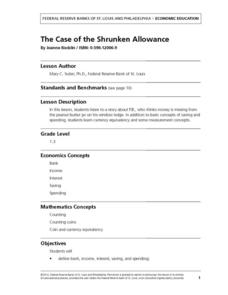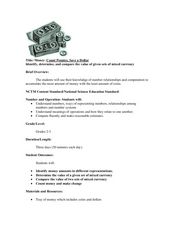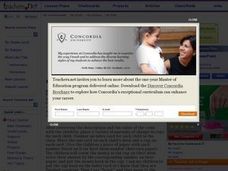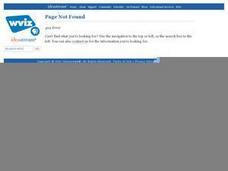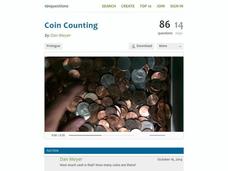Curated OER
Money Versus Trade
Students discover the importance of exchanging money in a market. In this economics instructional activity, students discover natural resources and how one can barter with those resources. In addition, students complete worksheets and...
LearnEnglishFeelGood.com
Count or Non-Count Nouns?
Many learners struggle with the difference between count and non-count nouns. When do you use a few or a little? Or much or many? Take a look at ten sentences where young grammarians can...
Illustrative Mathematics
Currency Exchange
Take your class on a North American adventure with a currency conversion problem. Pupils are asked to change US dollars into Canadian dollars and then to Mexican pesos. The commentary includes two solutions, converting by unit rates and...
Federal Reserve Bank
The Case of the Shrunken Allowance
An allowance is an important thing! Make sure your kids know how to save and spend their own money. Using the book The Case of the Shrunken Allowance as a starting point, this plan covers income, spending and saving, counting, and more.
Los Angeles County Office of Education
Assessment for the California Mathematics Standards Grade 1
Here is an assessment designed to test mathematicians' knowledge of writing numbers, comparing numbers, skip counting, solving addition and subtraction problems; along with measuring objects, telling time, identifying shapes, reading...
DK Publishing
Real-life Word Problems, Part 5
Bring these four word problems to your second grade class to reinforce addition, subtraction, and money math. The problems provide space to write out the proper equations, as well as separate areas to fill in the answers. Use these...
Curated OER
Practice Estimating!
Bring math home with this interative estimating worksheet! Scholars make educated guesses about the number of six household items: crayons in a crayon box, keys on a key ring, coins in a piggy bank, trees in the yard, pictures on the...
Curated OER
Buckets of Bucks for World Hunger
Students participate in a nonprofit organization activity for hunger outreach problems. In this service project lesson, students practice counting coins, complete a service project for a hunger outreach, discuss nutrition and healthy...
Curated OER
Money: Count Pennies, Save a Dollar
Students determine how to make the largest sum of money using the least amount of coins. In this mixed currency lesson, students listen to a reading of If You Made a Million by David M. Schwartz before participating in money counting...
Curated OER
Savings Accounts and Interest
First graders study money, banks, and getting interest on money. In this consumer math lesson, 1st graders listen to Stan and Jan Berenstain's, Berenstain Bears' Trouble With Money. They use the concepts in the book to discuss...
Curated OER
Scoot for Money
Students rotate through a group of centers counting the coins that are in a cup placed at each spot. After completing the entire circuit, papers are graded as a whole class and each student gets to spend the money in their cup at a class...
Curated OER
Give Me the Money
Young scholars view a money transaction on video and identify the steps involved in making a purchase and calculating change. They write out original money math problems and exchange them with classmates.
Curated OER
Buggin' Out (Identifying and Adding Amounts of Money)
Learners explore consumer math by participating in estimate exercises. In this currency lesson, students identify and define each piece of U.S. currency and their value to the monetary system. Learners complete several money worksheets...
Curated OER
Making Change
Second graders explore how to incorporate a new type of technology, the cash register and/or a calculator, as a motivational tool for solving real life problems. They practice estimating money and counting back change from $20.00.
Curated OER
Show Me the Money
Students review the terms in the "Money Vocabulary Word Bank." They make a wallet or purse to keep their money in. Students learn the song "Show Me the Money." They participate in five centers: 1) Head or Tails Tally, 2) Piggy Bank...
Curated OER
One Dollar
In this money practice worksheet, students sharpen their problem solving skills as they solve 6 story problems that involve sums of 1 dollar.
Curated OER
Addition With Coins and Dollar Bills
In this coins and bills worksheet, 2nd graders solve 5 addition problems using coins and bills instead of numbers. Students write their answers up to $5.00 on the lines provided.
101 Questions
Coin Counting
Cash in on a great resource. After watching a video of a coin counter, pupils estimate the number of coins and the amount of money they see. They then use additional given information and systems of equations to find the actual values.
Curated OER
Dividing by 10
Use money to help scholars understand dividing by 10. They examine a visual displaying one dollar as equivalent to 10 dimes. Then, learners examine sets of 10 dimes to determine how many dollars are represented in each problem. One is...
Curated OER
Teaching Money
Students identify the coins and bills used in the United States. They write the amounts of each bill and coin and practicing counting different amounts. They follow a demonstration about how to count money as well.
Curated OER
How Much More?
In this counting coins worksheet, students color the coins that match the given money amount for each child. Students then color the coins each child will use, but color the fewest number of coins possible.
Curated OER
Piggy Bank Math
Students practice solving money problems. In this counting coins lesson, students follow the outlined steps and use mixed operations to determine the coin combinations needed to solve a math word problem.
Curated OER
Musical Money
Third graders participate in the game Musical Money. The game Musical Money is fashioned after the game Musical Chairs, but students count money using a time limit.
Curated OER
Adding Instruments
In this counting money learning exercise, students practice their math skills as they examine the prices of 3 items and respond to 4 questions that require then to count money.





